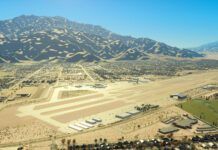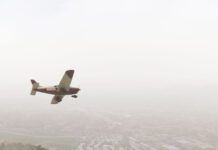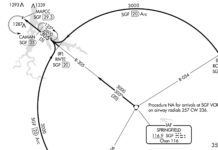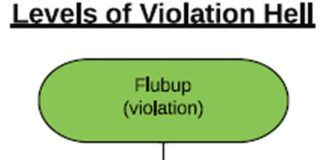Concerns about pilot aging are just as important for the younger pilot as for the more silver-haired among us. The US population is getting greyer, and it’s plain to see when looking around any airport, so too is the average pilot. This aging brings numerous challenges and a few rewards that should be important to all of us.
Trending Older
Of the more than 650,000 US certified pilots, nearly 10%, are over the age of 65 and more than 4700 are over the age of 80, and this aging of pilots overall will almost certainly continue. According to the U.S. Census Bureau in a 2008 press release, by 2030 nearly one in five U.S. residents is expected to be 65 or older, and by 2050 this age group is projected to more than double.
Similarly, the 85 and older population is expected to more than triple by 2050.
Aging is not necessarily a bad thing. Given the alternative, I’d propose that aging is something all of us would like to do successfully. Numerous studies show that age alone is only weakly correlated with flight performance and furthermore, the accident records indicate that older pilots are generally safe pilots—as safe, or safer than pilots in their 20’s.
Effects—Good and Bad
Experience gained with age appears to compensate for the mild slowing down that comes as we build that experience over time. With age comes the benefit of experience; nearly two thirds of the pilots over age 65 held commercial, CFI or ATP certificates and nearly a quarter of those over age 80 were flight instructors.
However, it should come as no surprise that increasing age brings slower reaction times and reduced ability to deal with novel situations. Older age also comes with more medical problems that can affect flying skills and make maintaining medical certification challenging.
Many of the diseases associated with age can be well managed. But those affecting cognitive performance such as early dementia, or those affecting vision such as macular degeneration and glaucoma are of more immediate concern for flight safety. Sudden death or incapacitation, such as with a heart attack, receives a lot of attention but is actually a very rare event in flight, although not unknown.
No amount of experience will safely compensate for significant medical problems, such as early dementia or strokes. This is why prevention is so important, and why the effects of aging and mitigating those effects as much as possible concerns not only older pilots, but all pilots who wish to take a long-term view of their optimal health and piloting skill.
Old Pilots, Old Aircraft
As pilots are getting older, so is the general aviation fleet. In 2000, the nation’s 150,000 single-engine fleet averaged more than 30 years old. By 2020, that could approach 50 years. The FAA and aviation interest groups have paid particular attention to this in recent years, and it boils down to this: an airplane that is well maintained is going to be safer, and maintaining older airplanes requires more attention to detail. It is not a stretch to consider the “maintenance check” for an older pilot along similar lines.
The FAA, for example, prescribes more frequent medical exams for pilots over the age of 40, but that is only part of the story. Just as an aircraft with a fresh annual doesn’t mean it is free from all defects, passing an FAA physical is not an indicator of optimal health, and especially not of future optimal health.
The FAA medical exam typically screens for the most obvious of problems, and much depends on the quality of information exchanged between the pilot and the Aviation Medical Examiner (AME).
For example, vision is easily examined, and most often easily treated if defective. However, cognitive disease such as early dementia, or chronic health problems such as high blood pressure, diabetes, thyroid problems or high cholesterol are more insidious and might not be detected by the prescribed FAA medical examination.
Furthermore, the FAA exam doesn’t do much to promote future health. It’s simply not a replacement for a more comprehensive medical wellness review, such as would be typical with an annual physical with a primary care provider.
Some AMEs will do more in way of health promotion and disease prevention than others, though often along the lines of their individual specialty. A dermatologist AME may talk to you more about sun exposure and skin cancer prevention—important for pilots—and a cardiologist may talk to you more about heart health. The reality, though, is that the AME just has to get the pilot through the process, and the more health problems and paperwork there are to deal with, the less time there is to focus on prevention.
It’s Your Responsibility
What if your flying doesn’t require a medical? You’re still not off the hook. Every pilot should keep in mind the restrictions in the regulations. 14 CFR 61.53, Prohibition on operations during medical deficiency, section 2(b) Operations that do not require a medical certificate: For operations provided for in Sec. 61.23(b) of this part, a person shall not act as pilot in command, or in any other capacity as a required pilot flight crewmember, while that person knows or has reason to know of any medical condition that would make the person unable to operate the aircraft in a safe manner.
Responsibility for medical fitness for flight rests squarely with the pilot. You are still the person responsible for day to day health and ensuring fitness before each flight. (Remember the IMSAFE checklist.) You are the person with the most control over what your daily and future health will be.
So, what should a pilot do to take control of their long term medical proficiency for flight? Care of the human body is much like caring for an aircraft. Many pilots are more familiar with airframe maintenance than medical prevention, so let’s look at it that way.
Consider an aircraft that spent 15 years sitting on the ramp, covered in moss with flat tires (We’ve all seen them.), and one that was “always hangared, regularly flown,” like in the sales pitch. Which would you fly? Why does this matter? Just as the safety of an older aircraft depends on how it was flown and cared for throughout its life, a pilot who neglected his or her own care and maintenance and sat at a desk or on the couch for decades, is likely to have more problems and require greater care in later life. The pilot is the most critical system in the aircraft. As a result it is just as important to maintain and prepare the pilot, as it is the aircraft.
Many of us lament how little time we have, and how much effort it takes to care for ourselves well, but think about how much time, effort and expense a pilot will put into an aircraft to keep it safe.
Nobody’s immune. Even I have spent countless hours maintaining my 1950 Pacer. Yet, if I’d spent just half that much time and effort on exercise and healthy diet, I’d probably look and feel 10 years younger, and would probably be a sharper pilot too. Just putting this down on paper is making me question my own maintenance, and I should know better.
Issues
The obesity epidemic in the western world is growing. Diseases such as high blood pressure, diabetes, heart attacks, strokes, dementia and sleep apnea are but a few conditions commonly associated with excessive weight. Pilots are not immune. It is no secret that common sense healthy diet and exercise are important.
Pilots need adequate rest, good nutrition and physical activity not only to prevent disease, but also to ensure optimal performance. Proper diet and exercise in a common sense lifestyle are critical to optimize physical and mental health.
With the population’s advancing age, concern over Alzheimer’s dementia becomes a major concern. Emerging understanding of the pathophysiology of Alzheimer’s suggests that early prevention, decades before clinical symptoms occur, may be key to effectively reduce the risk in later life.
The most significant risk factors for development of dementia are older age and genetic predisposition; however, the risk of developing dementia is linked to other factors such as diabetes, hypertension, obesity, smoking, inactivity and poor diet—all the same risk factors for many other diseases.
I’m often asked about vitamins and supplements. It’s just easier to take a pill, right? There is no convincing evidence that vitamins or supplements are effective, absent a vitamin deficiency. Presently, more evidence exists for the effectiveness of diets with high levels of omega-3. Diets high in omega-3, such as the Mediterranean-type diet, fish oil or coconut oil (or possibly supplements) may provide long term health benefits.
The association between extensive flight experience and better performance in later life is strong. I encourage all pilots to pursue lifelong flight training and currency to maximize flight skills and performance, as well as protect that performance in later life. Lifelong learning, such as with flight training, may also help reduce risk of dementia in later life.
Ace That Exam
Now, let’s get back to that FAA flight physical. Just like flying, preparation is key. Less than one tenth of one percent of flight physical applications are denied, though deferrals and special issuances are more common. Delays and difficulties with FAA medical certification are commonly due to insufficient understanding and preparation. Health problems ignored, untreated, undertreated or not reported are common causes of medical certification delay. Awareness of the health problem, the necessary treatment and the steps required for certification before applying, will assuredly improve chances of a smooth certification process.
Before a medical, just like before every flight, it is in the pilot’s interest to review all available relevant information. This information can be readily obtained in the online age. The FAA.gov website contains a searchable AME guide. A simple web search will usually readily lead you to the information you need.
Recently, the process of certification has become easier for certain conditions. Conditions for which an AME can issue medical certification without prior FAA review include: Arthritis, Asthma, Glaucoma, Chronic hepatitis C, Hypertension, Hypothyroidism, Migraine or chronic headache, Pre-diabetes and Renal cancer. The AME guide contains a link to certification worksheets that outline what is required for each condition.
If you’re concerned about a condition that may interfere with your flight physical, you should simply contact your AME directly and ask what is needed. Your AME should appreciate this, as it will often save both of you time and effort.
There are plenty of online resources. The AOPA website has extensive information on pilot health and fitness. You may also call your regional FSDO with specific questions you can’t answer elsewhere. Never be afraid to ask; it’s better to identify problems and make sure you take care of them quickly. Ideally, you should have all necessary documentation in hand before filling out your FAA application.
The office of aerospace medicine also provides online pilot education materials covering a range of health and flight safety related topics at www.faa.gov/pilots/safety/pilotsafetybrochures/. The “Fit for Flight” brochure in particular covers many of the benefits of physical fitness and healthy lifestyle with relevance to flight safety and performance.
Pilot physical fitness may be even more beneficial if it prevents cognitive decline. Other useful brochures are: Alcohol and Flying, Fatigue in Aviation, Hypoxia, Medical Certification Questions and Answers, Medications and Flying, Obstructive Sleep Apnea, Pilot Medical Certification and Information for the Aviation Community and Pilot Vision.
Beyond maintaining flight proficiency with currency and training, maintaining good health is an important aspect of longevity and optimizes our flying ability through improved physical and mental performance. It is as important as aircraft maintenance in assuring longevity. Ask yourself: “What sort of flying do I see myself doing in 10 years…in 20 years? Could I eat better, get more rest or more regular exercise? Could a healthier lifestyle make me a better and safer pilot, now, and in the long run?” Just as common sense guides much of your flying, it can also answer these questions.
Dr. Ronan Murphy, MBChB is an FAA Senior Medical Examiner and board certified neurologist, specializing in behavior, cognitive performance and aging. He’s also an active pilot with a passion for soaring and old/slow taildraggers.





